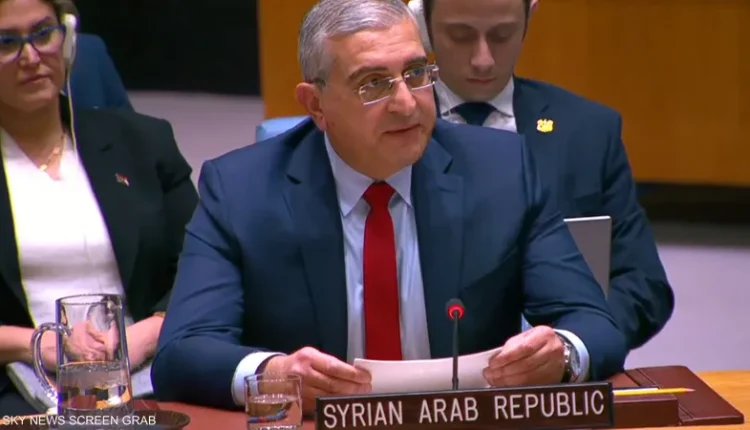Syrian UN Envoy Urges International Action Against Israeli Strikes
By Kardo Roj
DAMASCUS, Syria (North Press) –
Syria’s Permanent Representative to the United Nations, Qusai al-Dahhak, called on Thursday for the immediate and unconditional withdrawal of Israeli forces from all Syrian territories, denouncing what he described as ongoing Israeli violations of Syria’s sovereignty.
Speaking during a UN Security Council session in New York, al-Dahhak reiterated Syria’s rejection of Israel’s continued military presence and activities in the Golan Heights and surrounding areas, demanding full compliance with the 1974 Disengagement Agreement.
“The Israeli army is not only occupying our land,” al-Dahhak said, “but now promotes settler tourism in the territories it has unlawfully penetrated, which is a blatant violation of international law.”
In a parallel statement, United Nations officials expressed serious concern over the escalating pattern of Israeli airstrikes in Syria, warning that continued attacks undermine efforts toward a sustainable political transition.
A UN spokesperson noted that “any attempt to entrench a long-term presence in Syrian territory stands in clear violation of international agreements,” adding that the situation “threatens both regional stability and the integrity of Syria’s ongoing transition process.”
This comes amid a broader regional context of mounting tensions and military escalations in the Israeli-Syrian theater, particularly as Syrian infrastructure and civilian areas have repeatedly been targeted in recent months, according to humanitarian monitors and rights groups.
Al-Dahhak stressed that Syria reserves the right to defend its sovereignty and pursue political stability through its ongoing transitional governance. “Every day that the Security Council delays action emboldens further aggression and deepens instability,” he warned.
Since the appointment of President Ahmad al-Shar’a as head of Syria’s transitional government, Damascus has increasingly leaned on international forums to assert its political legitimacy and territorial claims.
The transitional government has sought to reframe Syria’s diplomatic engagement, as seen in recent overtures to countries like South Korea and Lebanon. Syria’s position at the UN reflects this shift toward restoring international recognition and challenging what it views as unlawful foreign military presences.
Israel has long justified its military activity in Syria as necessary to counter Iranian influence and armed groups allegedly operating within Syrian borders. However, critics argue that such justifications often result in the targeting of Syrian infrastructure and risk exacerbating tensions across the region.
While the UN’s condemnation of Israel’s strikes represents a diplomatic stance, it remains unclear whether it will lead to concrete resolutions or enforcement mechanisms. Past efforts to hold Israel accountable in international forums have routinely stalled due to political divisions within the Security Council.
In northeast Syria, where the Autonomous Administration of North and East Syria (AANES) continues to exercise governance and the Syrian Democratic Forces (SDF) maintain local security with international support, stability remains critical. Regional instability — especially from cross-border military activity — has the potential to disrupt humanitarian aid, reconstruction efforts, and the fragile political landscape.
As Syria’s transitional government advances its efforts to reestablish national sovereignty and rebuild diplomatic relationships, international support — or lack thereof — for its territorial claims will significantly influence the country’s future trajectory.

